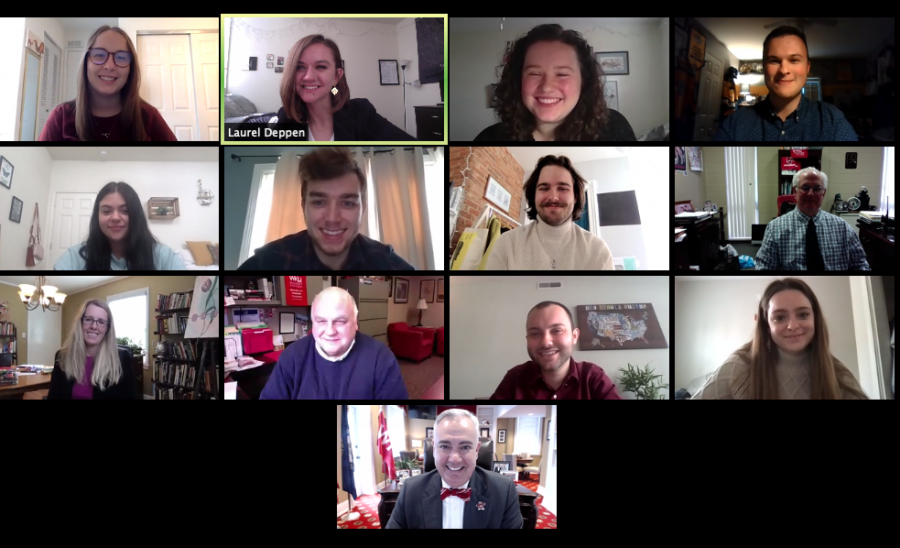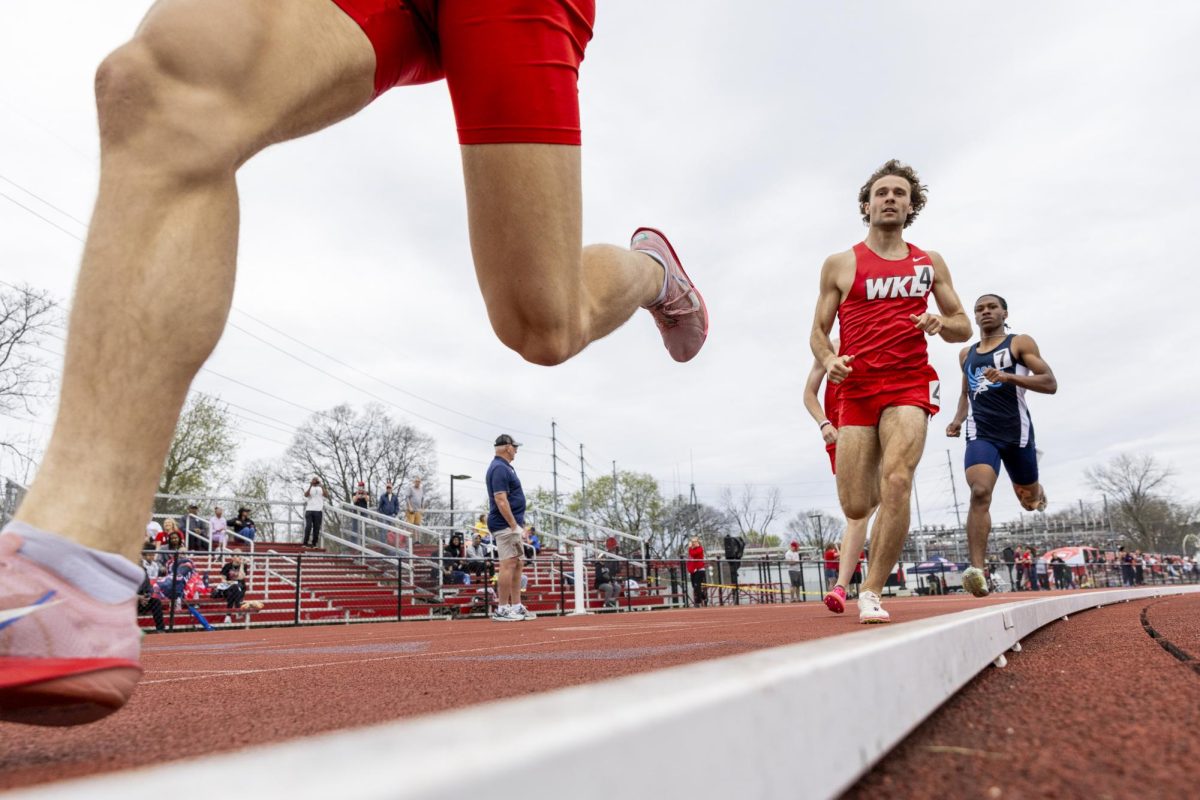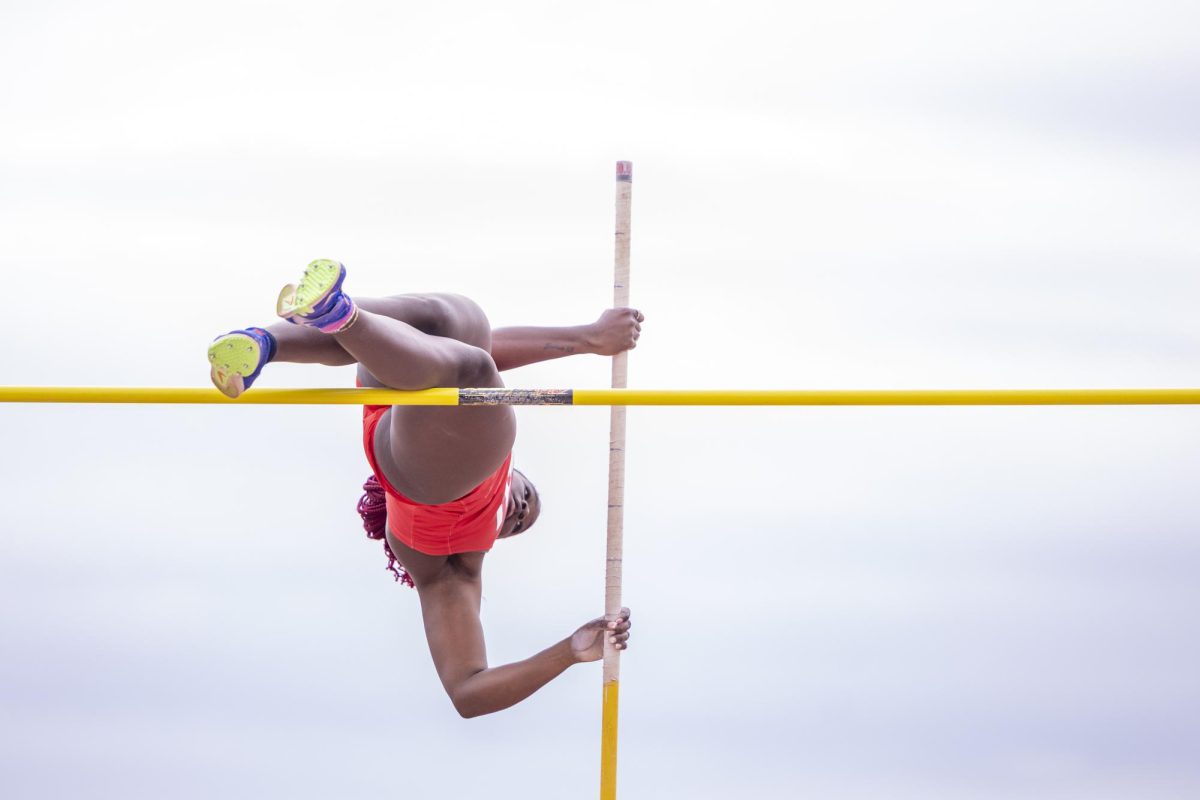8 things we learned in a meeting with President Caboni
January 15, 2021
Healthy on the Hill precautions will look the same this spring as students prepare for the first day of classes Tuesday, and WKU President Timothy Caboni said he’s encouraged by what he saw in the fall.
Ahead of reopening, Caboni spoke with the Herald editorial board about the state of WKU and what students can expect upon return to the Hill.
What is WKU’s vaccination plan?
While Kentucky is regularly receiving doses of the vaccine, the administration process is still working through phases 1A and B, focused on healthcare providers, long-term care and assisted living facilities, and first responders, K-12 providers and people over 70 respectively.
Post-secondary education is a part of the 1C vaccination group, which also includes essential workers, anyone 60 or older, and anyone 16 or older that meets the CDC high risk conditions, according to Team Kentucky’s vaccine website.
Caboni said there are 1.1 million people in the 1C phase.
“I know everyone wants information. We don’t have the information to be able to share,” Caboni said. “This is a tremendous logistical undertaking from the federal government and state government, and so right now we’re working through local hospitals.”
Of the thousands of places able to distribute the vaccine, Graves Gilbert Clinic, WKU’s health services partner, does not currently have the ability to distribute the vaccine.
“We are ready and able as soon as we have supply,” Caboni said. “We have no idea when that will occur hopefully sooner rather than later. And hopefully, weeks not months.”
Bob Skipper, director of public relations, said the university is in the process of finalizing a survey for the campus community to see who would be interested in receiving the vaccine if it’s offered on campus.
“I think it’s a good sign that so many individuals are interested in having the vaccine,” Caboni said. “There is more demand than supply and we just have to make sure that we’re prepared when the supply increases or gets to us.”
What COVID-19 procedures are changing this spring?
Caboni said the spring semester will look similar to the fall semester. One-third of courses will continue to be distributed in an online format, while the other two-thirds will be distributed either in-person or in a hybrid format.
“What we learned last fall is that if we wash our hands, stay 6 feet apart and wear masks that we can do this and meet our mission,” Caboni said. “I’m encouraged by what I saw in the fall semester, that campus was the safest place in Warren County for you to be to avoid exposure to the virus.”
Most Healthy on the Hill guidelines will remain unchanged from the fall semester to the spring semester, but not all.
“Really the only change that we’ll see from the Healthy on the Hill guidelines is a slight change in the quarantine time,” Skipper said. “It goes in line with the latest CDC recommendations.”
This spring, the quarantine period will change from 14 days to 10 days from the onset of symptoms. Students who test positive and students that have been in contact with someone who tested positive will be able to be released after 10 days of quarantine if they test negative and show no symptoms.
“We’ll go from 14 days to 10 days if you have a negative test at the end of 10 days and show no symptoms,” Skipper said.
The administration saw no transmission of COVID-19 in instructional settings in the fall semester, Caboni said. To continue to keep students safe, Caboni encouraged students to keep up the effort from last semester.
“As we return to campus, even though we’re all tired, we’re going to have to redouble our efforts to follow the Healthy on the Hill guidelines,” Caboni said. “If we try hard and make sure we’re disciplined, we can get to the place where, at the end of the spring semester and over the summer, we can return to some sort of normalcy, hopefully by the fall.”
In response to the fall semester’s P/D/F option, Caboni did not indicate that there would be any similar accommodations for the spring semester. There will not be any institution-wide decisions on mental health breaks, either.
Will there be an in-person commencement ceremony in Spring 2021?
The Commencement ceremonies for Fall 2020 and Spring 2021 graduates are scheduled for April 30 and May 1. The ceremonies for the Spring 2020 graduates are scheduled for May 7 and 8.
Because WKU had a football season with fans, WKU thinks an in-person commencement can be safe, Caboni said.
“We’re going to watch as the semester progresses,” Caboni said. “…With some tweaks we think we can hold a safe commencement ceremony, an activity that appropriately recognizes and celebrates the classes of 2020 and the class of 2021.”
Caboni said there will be more details closer to time. However, these graduation dates have not changed.
Plans to increase the budget
Caboni said retention rates and tuition significantly helped to increase the university’s budget. The retention rate isn’t available, but he predicts it will be similar to last semester, a record year for retention.
There were some concerns regarding retention from last fall to now with the number of hybrid and online courses, but from the number’s available so far, students enrolled in hybrid and in-person courses re-enrolled at higher rates than those in fully online courses.
“We want to continue to work on those who were online only, but it does demonstrate the importance of in-person instruction for our community,” Caboni said.
At the beginning of the pandemic, faculty and staff voluntarily took salary reductions in order to help fill the budget gap the university faced. Caboni said the class of 2024 was large enough, however, that the revenue gain by their tuition dollars was able to offset the anticipated deficit in the budget. The influx of money enabled the university to return the money faculty and staff had contributed.
Caboni’s strategy to maintain the budget is to put focus on recruiting for the next incoming class.
“It’s real simple,” Caboni said. “If we do better recruitment and better retention, we’ll do better on our budget, and we demonstrated that last fall.”
This recruiting strategy has been in development over the last three years, and it includes growing the net tuition revenue by focusing on scholarship programs that will help make WKU more affordable and accessible. Some examples are the Hilltopper Guarantee and in-state tuition scholarships that were introduced last semester.
“You are able to discount in such a way that you are actually able to generate more revenue for the university,” Caboni said.
What is WKU’s new Voluntary Separation Incentive Program?
The Voluntary Separation Incentive Program, announced on Jan. 13, offers a year-long salary upfront to eligible faculty and staff who agree to retire or end their employment with WKU, creating “institutional flexibility” Caboni said.
“It is not a cost saving exercise, it really is designed to encourage those who might have been thinking about retirement or are moving along to do that,” Caboni said.
Positions of those who leave will remain vacant for one year, allowing the university to recuperate the cost of the buy-out. After that timeframe, the university will examine the needs and situations of each department to determine if a replacement will need to be hired.
This allows the university to redistribute and consolidate faculty and staff to different schools and programs without layoffs.
“We don’t know how many [employees] will or won’t take advantage of the program, nor do we know where in the organization those positions will fall,” Caboni said. “But as that becomes more clear as we move through the spring semester, we’ll then be able to evaluate the demand that we have that we might have to make short term decisions to meet that demand.”
In an earlier interview, Director of Media Relations, Bob Skipper, said the university reserves the right to deny eligibility in order to prevent certain schools or programs from losing too many people.
Construction to wrap up for fall 2021
Caboni said two ongoing construction projects are expected to open for the fall 2021 semester.
The living learning community, the Freshman Village, was presented on the housing application process to incoming freshmen.
The construction on the WKU Commons at the Helm Library is also expected to finish in time to open in the fall.
Athletic experience and sacrifice
Caboni said athletes on campus have to sacrifice doubly. “If they had not, there would not have been as many games played in the fall,” he said.
“The self-discipline and the willingness to sacrifice, all of the things outside of class in practice that they’ve had to do has been remarkable,” Caboni said. “They’re here because they want number one want an education and a WKU degree but number two they wanted to play sports as they get that degree.”
Caboni said he was still evaluating if the student fee for athletics would change. The current fee is $436 annually for WKU students.
“Compared to other Conference USA schools we are incredibly efficient and get a lot of bang for our buck,” Caboni said. “I am proud of the work that our athletics department does with fiscal constraints and the sacrifices they have made.”
The Hilltopper Athletic Foundation tweeted on Jan. 12 that in a year the total donor increase is up 76% and the total revenue increased 20% for the athletic department.
“So, I think that for individuals who come here because they want to watch collegiate sports particularly football and basketball and volleyball, that folks should take advantage of that,” Caboni said. “It’s incredibly important to who we are as a university, and it will continue to be playing an important role as we recruit students to the Hill.”
Caboni’s contract set to expire
Caboni’s four-year contract with the university is set to expire in June. His performance is being evaluated by the Board of Regents, he said.
“I am hopeful that we at some point will move into contract negotiations, and we’ll see how that goes,” he said.















